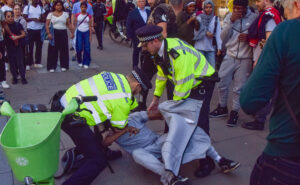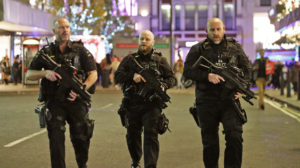Just when you thought it was safe to go back to the post-Bibby Stockholm seaside, Britain’s coastline has become assailed by a new moral panic: TikTok-inspired, flash-mob looting. Such behaviour is “appalling” and “unacceptable”, tutted Rishi Sunak this week, before slipping in that its recent flare-ups “obviously happened while I was abroad”. But just as Alan Clark famously praised our football hooligans as “a kind of compliment to the English martial spirit” when going mano a mano against foreign yobs, perhaps it’s time we also gave our looters and rioters a little more credit.
Hear me out. After descending on Oxford Street last Wednesday, scores of “troublemakers” urged a bunch of copycat looters to shift their focus to the careworn seaside town of Southend and “get lit”. In response, the Home Secretary, Suella Braverman, ordered the Met to “hunt down and lock up” the culprits, as though they were the Krays.
Obviously, crime is part of Braverman’s brief; and the Tories are desperate to regain their status as the party of law and order, not least because too many of their own (prime) ministers have been on the wrong side of the police. But the Oxford Street flash mob was no Cable Street riot; and the events in Southend turned out to be far tamer than anything previous generations of mods, rockers and sundry other yobs had brought to the Essex town.
This isn’t to excuse the sort of mass, wanton disregard for the law that we’ve seen of late. But it is hard not to conclude that the same vote-grabbing politicians who whipped up moral panics over ram-raiders, Rolex-robbers and other media-hyped miscreants now want looters to as the bogeyman du jour — even if, in reality, these wayward youths are part of a more complex criminal profile that can’t be easily dismissed as a (largely black) youth problem.
It’s easy to blame absent fathers, again because this is a well-honed stereotype, but the frequent promotion of this dead cat fails to address the real problem here: Britain’s lack of leadership or adult responsibility. Whether it’s pederastic TV presenters or man-child prime ministers, Britain’s culture of role-modelling and leadership makes the average package-tour rep look like Shaka Zulu. How can we expect bored, feckless, confused, constantly castigated and pandemic-traumatised young people to cosplay as upstanding citizens when adults in positions of responsibility can’t even be bothered to do so themselves?
But perhaps that was never the point, given the degree to which conspicuous youth crime and deviant behaviour is imbued with media and political capital. Looting makes for a good story because it conspicuously feeds into our subconscious biases about “the other”. It’s a form of mass projection. Better to blame other parents for their errant brood, who we can see on TV and social media, than wonder why your own children might also be suffering from any number of modern malaises at home — eating disorders, self-harm, anxiety — all of which are expressions of a looting of the self.
And this is always the way with every moral panic. Whether it’s Jews, Italians, West Indians, Pakistanis, Somalians, Albanians, Polish plumbers, acid house ravers, radical feminists, Black Lives Matter or Gary Lineker, there’s always some bogeyman hiding in plain sight, trying to usurp the British. Every manifestation shares one thing in common: a sense of disenchantment, of losing control. Today, it takes the form of a pandemic generation of internet-impressionable and vulnerable youths who have all but given up on the idea of youth being “the best days of your life”. For many, these are the worst days.
Despite this, Britain’s politicians seem content with dismissing the nation’s arrested development as “the kind of lawlessness seen in some American cities”, blind to the fact that the causes, and solutions, lie closer to home. During the UK’s 2011 riots, which had nothing to do with “American lawlessness” and everything to do with “broken Britain”, the general consensus was that a “feral underclass” of looters deserved the draconian sentences they received. The logic here was that the riots were not a political act but a mass criminal enterprise — and, as such, Westminster could shift responsibility away from its policymaking and let the courts deal with the problem.
Fundamentally, the rioters’ behaviour in 2011 was criminal, as is today’s looting. But visit inner-city Britain or its less-than-picture-postcard rural and suburban wastelands and you will witness the real conditions people are living under. We know that poverty isn’t just about a lack of money. It’s about a lack of opportunity, prospects and hope. As Thatcher and Cameron, then Blair and Brown, mortgaged British society, economically and morally, today’s political leaders are squandering what’s left. Riots and looting and recession are their legacy.
In 2011, one of the rioters sent out a Blackberry message in pidgin text-speak that illustrated the mentality of this disorder: “What ever ends [area] your from put your ballys [balaclavas] on link up and cause havic, just rob everything. Police can’t stop it.” David Lammy, the MP for Tottenham, remarked at the time that this was freedom “without any sense of duty”. “Our society needs to reconnect with other important, informal regulators of behaviour. Notions of decency towards others. Pride. Shame. Admiration. Scorn.” More than a decade later, plus ça change.
Disclaimer
Some of the posts we share are controversial and we do not necessarily agree with them in the whole extend. Sometimes we agree with the content or part of it but we do not agree with the narration or language. Nevertheless we find them somehow interesting, valuable and/or informative or we share them, because we strongly believe in freedom of speech, free press and journalism. We strongly encourage you to have a critical approach to all the content, do your own research and analysis to build your own opinion.
We would be glad to have your feedback.
Source: UnHerd Read the original article here: https://unherd.com/



